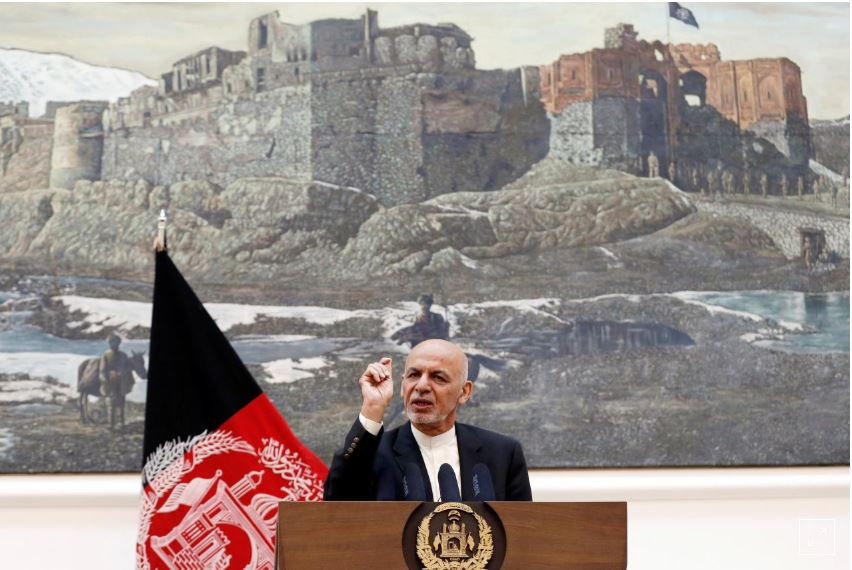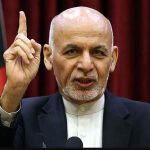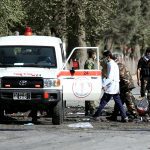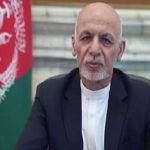Afghanistan’s President Ashraf Ghani rejected on Sunday resignations tendered a day earlier by three senior security officials, the government said.
The resignations from Defence Minister Tariq Shah Bahrami and Interior Minister Wais Barmak, as well as Masoom Stanekzai, the head of the National Directorate of Security, were submitted on Saturday hours after National Security Adviser Hanif Atmar quit.
Government spokesman Haroon Chakansuri said in a statement Ghani had asked the three officials to continue with their duties and “work toward the betterment of the security situation”.
Two senior interior ministry officials said the security officials had cited policy differences with the government amid deteriorating security as the main reason for resigning.
However, Ghani rejected the resignations and instead instructed them to find ways to prevent fresh attacks by militant groups.
Heavy fighting between Taliban insurgents, as well as other militant groups, and security forces has raged across Afghanistan this year. There have also been suicide attacks in Kabul and other major cities.
Authorities have been bracing for more attacks with parliamentary elections due on Oct. 20. The scale of the violence has shocked government officials, who are facing bitter criticism over their handling of the war.
Afghanistan’s President Ashraf Ghani rejected on Sunday resignations tendered a day earlier by three senior security officials, the government said.
The resignations from Defence Minister Tariq Shah Bahrami and Interior Minister Wais Barmak, as well as Masoom Stanekzai, the head of the National Directorate of Security, were submitted on Saturday hours after National Security Adviser Hanif Atmar quit.
Government spokesman Haroon Chakansuri said in a statement Ghani had asked the three officials to continue with their duties and “work toward the betterment of the security situation”.
Two senior interior ministry officials said the security officials had cited policy differences with the government amid deteriorating security as the main reason for resigning.
However, Ghani rejected the resignations and instead instructed them to find ways to prevent fresh attacks by militant groups.
Heavy fighting between Taliban insurgents, as well as other militant groups, and security forces has raged across Afghanistan this year. There have also been suicide attacks in Kabul and other major cities.
Authorities have been bracing for more attacks with parliamentary elections due on Oct. 20. The scale of the violence has shocked government officials, who are facing bitter criticism over their handling of the war.
Afghanistan’s President Ashraf Ghani rejected on Sunday resignations tendered a day earlier by three senior security officials, the government said.
The resignations from Defence Minister Tariq Shah Bahrami and Interior Minister Wais Barmak, as well as Masoom Stanekzai, the head of the National Directorate of Security, were submitted on Saturday hours after National Security Adviser Hanif Atmar quit.
Government spokesman Haroon Chakansuri said in a statement Ghani had asked the three officials to continue with their duties and “work toward the betterment of the security situation”.
Two senior interior ministry officials said the security officials had cited policy differences with the government amid deteriorating security as the main reason for resigning.
However, Ghani rejected the resignations and instead instructed them to find ways to prevent fresh attacks by militant groups.
Heavy fighting between Taliban insurgents, as well as other militant groups, and security forces has raged across Afghanistan this year. There have also been suicide attacks in Kabul and other major cities.
Authorities have been bracing for more attacks with parliamentary elections due on Oct. 20. The scale of the violence has shocked government officials, who are facing bitter criticism over their handling of the war.
Afghanistan’s President Ashraf Ghani rejected on Sunday resignations tendered a day earlier by three senior security officials, the government said.
The resignations from Defence Minister Tariq Shah Bahrami and Interior Minister Wais Barmak, as well as Masoom Stanekzai, the head of the National Directorate of Security, were submitted on Saturday hours after National Security Adviser Hanif Atmar quit.
Government spokesman Haroon Chakansuri said in a statement Ghani had asked the three officials to continue with their duties and “work toward the betterment of the security situation”.
Two senior interior ministry officials said the security officials had cited policy differences with the government amid deteriorating security as the main reason for resigning.
However, Ghani rejected the resignations and instead instructed them to find ways to prevent fresh attacks by militant groups.
Heavy fighting between Taliban insurgents, as well as other militant groups, and security forces has raged across Afghanistan this year. There have also been suicide attacks in Kabul and other major cities.
Authorities have been bracing for more attacks with parliamentary elections due on Oct. 20. The scale of the violence has shocked government officials, who are facing bitter criticism over their handling of the war.
Afghanistan’s President Ashraf Ghani rejected on Sunday resignations tendered a day earlier by three senior security officials, the government said.
The resignations from Defence Minister Tariq Shah Bahrami and Interior Minister Wais Barmak, as well as Masoom Stanekzai, the head of the National Directorate of Security, were submitted on Saturday hours after National Security Adviser Hanif Atmar quit.
Government spokesman Haroon Chakansuri said in a statement Ghani had asked the three officials to continue with their duties and “work toward the betterment of the security situation”.
Two senior interior ministry officials said the security officials had cited policy differences with the government amid deteriorating security as the main reason for resigning.
However, Ghani rejected the resignations and instead instructed them to find ways to prevent fresh attacks by militant groups.
Heavy fighting between Taliban insurgents, as well as other militant groups, and security forces has raged across Afghanistan this year. There have also been suicide attacks in Kabul and other major cities.
Authorities have been bracing for more attacks with parliamentary elections due on Oct. 20. The scale of the violence has shocked government officials, who are facing bitter criticism over their handling of the war.
Afghanistan’s President Ashraf Ghani rejected on Sunday resignations tendered a day earlier by three senior security officials, the government said.
The resignations from Defence Minister Tariq Shah Bahrami and Interior Minister Wais Barmak, as well as Masoom Stanekzai, the head of the National Directorate of Security, were submitted on Saturday hours after National Security Adviser Hanif Atmar quit.
Government spokesman Haroon Chakansuri said in a statement Ghani had asked the three officials to continue with their duties and “work toward the betterment of the security situation”.
Two senior interior ministry officials said the security officials had cited policy differences with the government amid deteriorating security as the main reason for resigning.
However, Ghani rejected the resignations and instead instructed them to find ways to prevent fresh attacks by militant groups.
Heavy fighting between Taliban insurgents, as well as other militant groups, and security forces has raged across Afghanistan this year. There have also been suicide attacks in Kabul and other major cities.
Authorities have been bracing for more attacks with parliamentary elections due on Oct. 20. The scale of the violence has shocked government officials, who are facing bitter criticism over their handling of the war.
Afghanistan’s President Ashraf Ghani rejected on Sunday resignations tendered a day earlier by three senior security officials, the government said.
The resignations from Defence Minister Tariq Shah Bahrami and Interior Minister Wais Barmak, as well as Masoom Stanekzai, the head of the National Directorate of Security, were submitted on Saturday hours after National Security Adviser Hanif Atmar quit.
Government spokesman Haroon Chakansuri said in a statement Ghani had asked the three officials to continue with their duties and “work toward the betterment of the security situation”.
Two senior interior ministry officials said the security officials had cited policy differences with the government amid deteriorating security as the main reason for resigning.
However, Ghani rejected the resignations and instead instructed them to find ways to prevent fresh attacks by militant groups.
Heavy fighting between Taliban insurgents, as well as other militant groups, and security forces has raged across Afghanistan this year. There have also been suicide attacks in Kabul and other major cities.
Authorities have been bracing for more attacks with parliamentary elections due on Oct. 20. The scale of the violence has shocked government officials, who are facing bitter criticism over their handling of the war.
Afghanistan’s President Ashraf Ghani rejected on Sunday resignations tendered a day earlier by three senior security officials, the government said.
The resignations from Defence Minister Tariq Shah Bahrami and Interior Minister Wais Barmak, as well as Masoom Stanekzai, the head of the National Directorate of Security, were submitted on Saturday hours after National Security Adviser Hanif Atmar quit.
Government spokesman Haroon Chakansuri said in a statement Ghani had asked the three officials to continue with their duties and “work toward the betterment of the security situation”.
Two senior interior ministry officials said the security officials had cited policy differences with the government amid deteriorating security as the main reason for resigning.
However, Ghani rejected the resignations and instead instructed them to find ways to prevent fresh attacks by militant groups.
Heavy fighting between Taliban insurgents, as well as other militant groups, and security forces has raged across Afghanistan this year. There have also been suicide attacks in Kabul and other major cities.
Authorities have been bracing for more attacks with parliamentary elections due on Oct. 20. The scale of the violence has shocked government officials, who are facing bitter criticism over their handling of the war.














